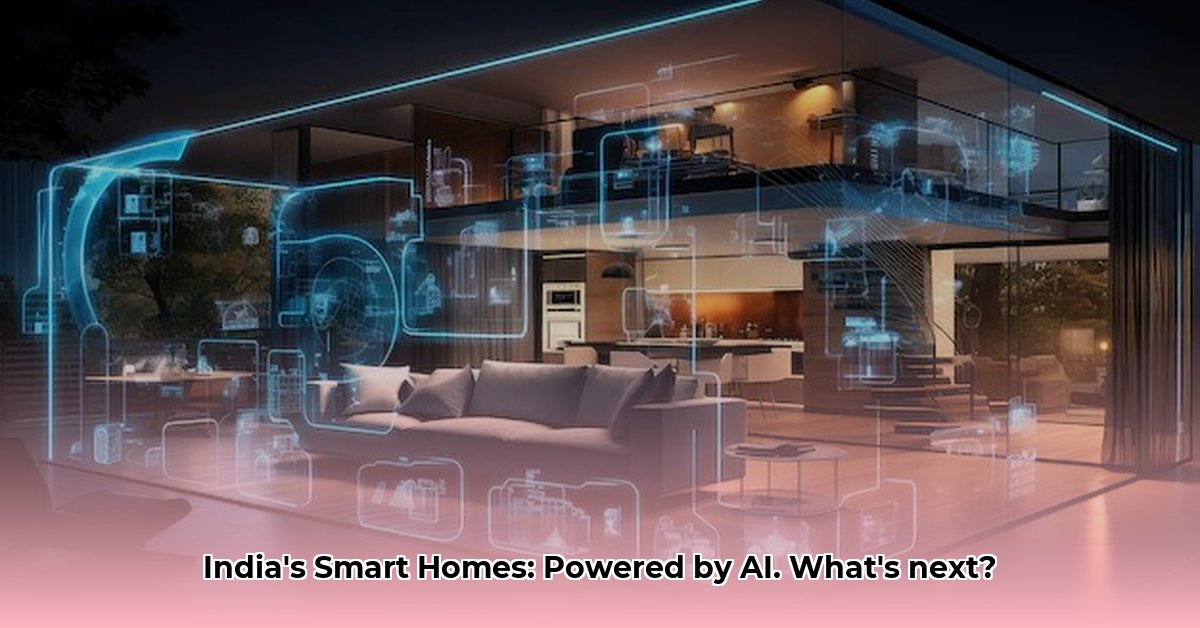India’s homes are on the cusp of a technological transformation. Artificial intelligence (AI) is no longer a futuristic fantasy; it’s quietly weaving its way into the fabric of Indian homes, promising a future of unprecedented comfort, security, and sustainability. This article delves into this evolving landscape, exploring the current state of AI in Indian smart homes, the benefits and challenges it presents, the emerging market trends, and the exciting possibilities that lie ahead.
The Rise of the Intelligent Home
The Indian smart home market is experiencing explosive growth, projected to reach nearly \$10 billion by 2029. While current penetration is estimated at 8-10% of households, experts predict a surge to 25-28% by 2028. This rapid expansion is fueled by several factors: increasing affordability, the proliferation of high-speed internet (especially with the rollout of 5G), and the rising demand for convenient and personalized home experiences. Companies like Atomberg (smart fans), Qubo (smart security), and Urban Company (smart appliances) are leading the charge, offering innovative AI-driven solutions that cater to the evolving needs of Indian consumers.
Inside the Indian Smart Home Market
The Indian smart home market is segmented into key areas: Smart Security (valued at approximately ₹1,300 crore), Smart Lighting & Control (₹4,500 crore), and Smart Small Appliances (₹2,000 crore). Security remains the primary driver for adoption, with 61% of smart home users investing in solutions like smart locks and cameras. Smart Lighting & Control, valued for convenience and energy savings, follows closely at 54% adoption. Smart appliances, while still emerging, are gaining traction at around 20% adoption. High Net Promoter Scores suggest a positive user experience, indicating satisfaction with the enhanced convenience, security, and efficiency provided by these technologies.
AI: The Brains of the Operation
AI elevates smart homes beyond simple automation. It introduces predictive intelligence, anticipating needs and proactively adjusting settings. Imagine your home preemptively cooling down before you arrive on a hot day, or dimming the lights as evening approaches. AI enhances security through facial recognition and anomaly detection, distinguishing between familiar faces and potential threats. It optimizes energy consumption through smart meters that learn your habits and adjust usage accordingly.
| Feature | Benefit | Example |
|---|---|---|
| Predictive Intelligence | Anticipates and fulfills needs automatically | Proactive thermostat, lighting adjustments |
| Enhanced Security | Proactively protects your home and family | Facial recognition, intrusion detection |
| Energy Management | Optimizes energy usage and saves money | Smart meters, adaptive appliance control |
Glimpsing the Future of Smart Homes
The future of AI in Indian homes is brimming with potential. Deeper AI integration will likely lead to seamless, context-aware experiences. Imagine your home recognizing you’re working from home and adjusting the lighting and temperature accordingly. Predictive maintenance will anticipate appliance issues, notifying you of potential problems before they arise. Personalized experiences will tailor the smart home environment to individual preferences, perhaps playing your favorite music upon waking or reminding you to take medication. Emerging trends point towards a growing focus on health and wellness features like air quality monitoring and sleep tracking, alongside sustainability initiatives like solar integration and smart water management.
Getting Started with Your Smart Home
Building your own smart home can be tailored to your budget. Basic AI-powered setups can start as low as ₹20,000, while comprehensive systems can exceed ₹1,00,000. Various platforms are available, including global giants like Amazon Alexa, Google Assistant, and Apple HomeKit, as well as domestic options from Godrej and Oakter. Researching each platform’s strengths and weaknesses will help you choose the best fit for your needs.
Navigating the Challenges
While promising, the rise of smart homes presents challenges. Data privacy and security are paramount. As homes collect more data, ensuring responsible and ethical handling is crucial. Bridging the digital divide and ensuring equitable access to smart home technology is another key consideration.
Comfort Redefined
AI transforms homes into personalized sanctuaries. Smart thermostats learn your temperature preferences and adjust accordingly, even factoring in weather forecasts. Smart lighting systems adapt to your activities, creating the ideal ambiance for work, relaxation, or sleep. Voice control and smartphone integration make managing these features effortless.
Enhanced Security
AI empowers proactive security. Facial recognition distinguishes between familiar faces and strangers, alerting you to unusual activity. Intrusion detection systems identify suspicious sounds or movements. Smart locks offer remote access control, guest access management, and entry/exit notifications. AI-powered smoke detectors differentiate between smoke and steam, minimizing false alarms, and even pinpoint fire locations for faster response.
A Sustainable Future
AI promotes eco-conscious living. Smart appliances optimize performance, minimizing energy and water waste. Smart irrigation systems prevent overwatering by monitoring soil moisture and weather. AI can even detect plumbing leaks, preventing costly repairs and water loss.
The Evolving Landscape and its Challenges
Several factors influence the adoption of AI in Indian homes:
| Factor | Influence |
|---|---|
| Affordability | Cost remains a barrier for some households. |
| Awareness | Many are unaware of AI’s potential benefits. |
| Infrastructure | Reliable internet and power supply are crucial. |
| Cultural Factors | Habits and preferences influence adoption. |
| Government Initiatives | Policies could incentivize wider adoption. |
Ongoing research and development aim to address these challenges. Incorporating local languages and cultural nuances into smart home interfaces is likely to be key for broader acceptance.
Examples of Indian companies driving this transformation include:
- Crompton Greaves Consumer Electricals: Offers a range of smart home products including fans, lights, and appliances controllable via a mobile app and compatible with voice assistants.
- Wipro Lighting: Provides smart lighting solutions with features like energy monitoring, scheduling, and integration with other smart home ecosystems.
- Oakter: Specializes in smart home security systems and offers various products like smart locks, cameras, and sensors.
The Future is Intelligent
The future of AI in Indian homes goes beyond simple automation. Imagine personalized experiences, predictive healthcare monitoring, and seamless integration with smart city infrastructure. While challenges remain, the potential benefits suggest a future where technology empowers more comfortable, convenient, and connected living.
Taking the First Step
Ready to explore? Start small. Experiment with a voice assistant, research different brands, and read reviews. These initial steps can provide a glimpse into the potential of AI and help you gradually integrate smart technology into your life.
| Feature | Potential Benefits | Potential Drawbacks |
|---|---|---|
| Voice Assistants | Hands-free control, convenience | Privacy concerns, internet reliance |
| Smart Lighting | Energy efficiency, personalized ambiance | Cost, compatibility |
| Smart Appliances | Automation, efficiency, remote control | Data security, complexity |
| Smart Security | Enhanced safety, proactive monitoring | Privacy concerns, cost, false alarms |
| AI-Powered Healthcare | Proactive monitoring, health insights | Data privacy, accuracy |
The journey towards truly intelligent homes is ongoing. While challenges exist, the potential benefits of AI are immense, promising a future where our homes actively contribute to our well-being. The ongoing research and development in this area suggests that the smart home of tomorrow might surpass even our most imaginative visions today.
- How to Produce Free Energy for Your Home - February 11, 2026
- How to Generate Electricity for Free at Home - February 10, 2026
- How To Produce Free Electricity By Generating Your Own Power - February 9, 2026
















